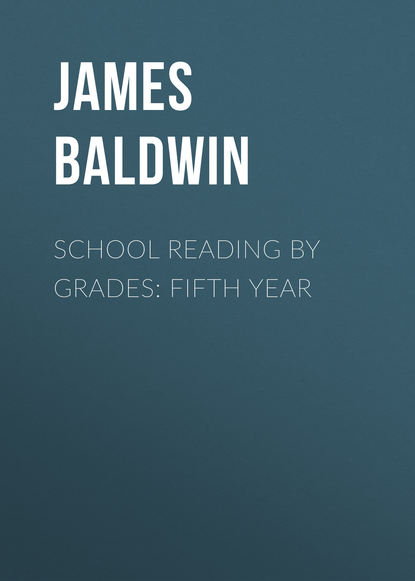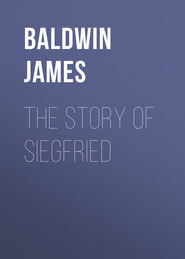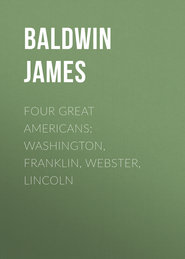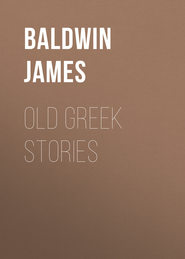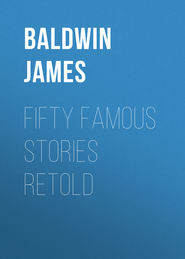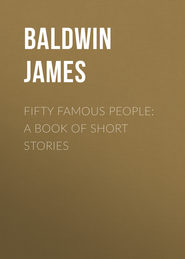По всем вопросам обращайтесь на: info@litportal.ru
(©) 2003-2024.
✖
School Reading By Grades: Fifth Year
Настройки чтения
Размер шрифта
Высота строк
Поля
– Henry W. Longfellow.
So nigh is grandeur to our dust
So near is God to man,
When Duty whispers low, “Thou must,”
The youth replies, “I can.”
– Ralph Waldo Emerson.
THE CHOICE OF HERCULES
One morning when Hercules was a fair-faced lad of twelve years, he was sent out to do an errand which he disliked very much. As he walked slowly along the road, his heart was full of bitter thoughts; and he murmured because others no better than himself were living in ease and pleasure, while for him there was little but labor and pain. Thinking upon these things, he came after a while to a place where two roads met; and he stopped, not quite certain which one to take.
The road on his right was hilly and rough, and there was no beauty in it or about it; but he saw that it led straight toward the blue mountains in the far distance. The road on his left was broad and smooth, with shade trees on either side, where sang thousands of beautiful birds; and it went winding in and out, through groves and green meadows, where bloomed countless flowers; but it ended in fog and mist long before reaching the wonderful mountains of blue.
While the lad stood in doubt as to which way he should go, he saw two ladies coming toward him, each by a different road. The one who came down the flowery way reached him first, and Hercules saw that she was beautiful as a summer day. Her cheeks were red, her eyes sparkled, her voice was like the music of morning.
“O noble youth,” she said, “this is the road which you should choose. It will lead you into pleasant ways where there is neither toil, nor hard study, nor drudgery of any kind. Your ears shall always be delighted with sweet sounds, and your eyes with things beautiful and gay; and you need do nothing but play and enjoy the hours as they pass.”
By this time the other fair woman had drawn near, and she now spoke to the lad.
“If you take my road,” said she, “you will find that it is rocky and rough, and that it climbs many a hill and descends into many a valley and quagmire. The views which you will sometimes get from the hilltops are grand and glorious, while the deep valleys are dark and the uphill ways are toilsome; but the road leads to the blue mountains of endless fame, of which you can see faint glimpses, far away. They can not be reached without labor; for, in fact, there is nothing worth having that must not be won through toil. If you would have fruits and flowers, you must plant and care for them; if you would gain the love of your fellow-men, you must love them and suffer for them; if you would be a man, you must make yourself strong by the doing of manly deeds.”
Then the boy saw that this lady, although her face seemed at first very plain, was as beautiful as the dawn, or as the flowery fields after a summer rain.
“What is your name?” he asked.
“Some call me Labor,” she answered, “but others know me as Truth.”
“And what is your name?” he asked, turning to the first lady.
“Some call me Pleasure,” said she with a smile; “but I choose to be known as the Joyous One.”
“And what can you promise me at the end if I go with you?”
“I promise nothing at the end. What I give, I give at the beginning.”
“Labor,” said Hercules, “I will follow your road. I want to be strong and manly and worthy of the love of my fellows. And whether I shall ever reach the blue mountains or not, I want to have the reward of knowing that my journey has not been without some worthy aim.”
CHRISTMAS AT THE CRATCHITS’
Then up rose Mrs. Cratchit, dressed out but poorly in a twice-turned gown, but brave in ribbons, which are cheap and make a goodly show for sixpence; and she laid the cloth, assisted by Belinda Cratchit, second of her daughters, also brave in ribbons; while Master Cratchit plunged a fork into the saucepan of potatoes, and getting the corner of his monstrous shirt collar (Bob’s private property, conferred upon his son and heir in honor of the day) into his mouth, rejoiced to find himself so gallantly attired, and yearned to show his linen in the fashionable Parks.
And now two smaller Cratchits, boy and girl, came tearing in, screaming that outside the baker’s they had smelt the goose, and known it for their own; and basking in luxurious thoughts of sage and onion, these young Cratchits danced about the table and exalted Master Peter Cratchit to the skies, while he (not proud, although his collar nearly choked him) blew the fire, until the slow potatoes bubbling up knocked loudly at the saucepan lid to be let out and peeled.
“What has ever got your precious father then?” said Mrs. Cratchit. “And your brother, Tiny Tim! And Martha wasn’t as late last Christmas Day, by half an hour!”
“Here’s Martha, mother!” said a girl, appearing as she spoke.
“Here’s Martha, mother!” cried the two young Cratchits. “Hurrah! There’s such a goose, Martha!”
“Why, bless your heart alive, my dear, how late you are!” said Mrs. Cratchit, kissing her a dozen times, and taking off her shawl and bonnet for her with officious zeal.
“We’d a deal of work to finish up last night,” replied the girl, “and had to clear away this morning, mother!”
“Well! never mind so long as you are come,” said Mrs. Cratchit. “Sit ye down before the fire, my dear, and have a warm, Lord bless ye!”
“No, no! There’s father coming,” cried the two young Cratchits, who were everywhere at once. “Hide, Martha, hide!”
So Martha hid herself, and in came little Bob, the father, with at least three feet of comforter exclusive of the fringe hanging down before him; and his threadbare clothes darned up and brushed, to look seasonable; and Tiny Tim upon his shoulder. Alas for Tiny Tim, he bore a little crutch, and had his limbs supported by an iron frame!
“Why, where’s our Martha?” cried Bob Cratchit, looking round.
“Not coming,” said Mrs. Cratchit.
“Not coming!” said Bob, with a sudden declension in his high spirits; for he had been Tim’s blood horse all the way from church, and had come home rampant. “Not coming upon Christmas Day!”
Martha did not like to see him disappointed, if it were only in joke; so she came out prematurely from behind the closet door, and ran into his arms, while the two young Cratchits hustled Tiny Tim, and bore him off into the washhouse that he might hear the pudding singing in the copper.
“And how did little Tim behave?” asked Mrs. Cratchit, when she had rallied Bob on his credulity, and Bob had hugged his daughter to his heart’s content.
“As good as gold,” said Bob, “and better. Somehow he gets thoughtful, sitting by himself so much, and thinks the strangest things you ever heard. He told me, coming home, that he hoped the people saw him in the church, because he was a cripple, and it might be pleasant to them to remember upon Christmas Day, who made lame beggars walk and blind men see.”
Bob’s voice was tremulous when he told them this, and trembled more when he said that Tiny Tim was growing strong and hearty.
His active little crutch was heard upon the floor, and back came Tiny Tim before another word was spoken, escorted by his brother and sister to his stool beside the fire; and while Bob, turning up his cuffs, – as if, poor fellow, they were capable of being made more shabby, – compounded some hot mixture in a jug with gin and lemons, and stirred it round and round and put it on the hob to simmer; Master Peter and the two ubiquitous young Cratchits went to fetch the goose, with which they soon returned in high procession.
Such a bustle ensued that you might have thought a goose the rarest of all birds; a feathered phenomenon, to which a black swan was a matter of course – and in truth it was something very like it in that house. Mrs. Cratchit made the gravy (ready beforehand in a little saucepan) hissing hot; Master Peter mashed the potatoes with incredible vigor; Miss Belinda sweetened up the apple sauce; Martha dusted the hot plates; Bob took Tiny Tim beside him in a tiny corner at the table; the two young Cratchits set chairs for everybody, not forgetting themselves, and mounting guard upon their posts, crammed spoons into their mouths, lest they should shriek for goose before their turn came to be helped. At last the dishes were set on, and grace was said. It was succeeded by a breathless pause, as Mrs. Cratchit, looking slowly all along the carving knife, prepared to plunge it in the breast; but when she did, and when the long-expected gush of stuffing issued forth, one murmur of delight arose all round the board, and even Tiny Tim, excited by the two young Cratchits, beat on the table with the handle of his knife, and feebly cried Hurrah!
There never was such a goose. Bob said he didn’t believe there ever was such a goose cooked. Its tenderness and flavor, size and cheapness, were the themes of universal admiration. Eked out by apple sauce and mashed potatoes, it was a sufficient dinner for the whole family; indeed, as Mrs. Cratchit said with great delight (surveying one small atom of a bone upon the dish), they hadn’t ate it all at last! Yet every one had had enough, and the youngest Cratchits, in particular, were steeped in sage and onion to the eyebrows! But now the plates being changed by Miss Belinda, Mrs. Cratchit left the room alone – too nervous to bear witnesses – to take the pudding up and bring it in.
Suppose it should not be done enough! Suppose it should break in turning out! Suppose somebody should have got over the wall of the backyard and stolen it, while they were merry with the goose – a supposition at which the two young Cratchits became livid. All sorts of horrors were supposed.
Hallo! A great deal of steam! The pudding was out of the copper. A smell like a washing day! That was the cloth. A smell like an eating house and a pastry cook’s next door to each other, with a laundress’s next door to that! That was the pudding! In half a minute Mrs. Cratchit entered – flushed, but smiling proudly – with the pudding like a speckled cannon ball, so hard and firm, smoking hot, and bedight with Christmas holly stuck into the top.
Oh, a wonderful pudding! Bob Cratchit said, and calmly too, that he regarded it as the greatest success achieved by Mrs. Cratchit since their marriage. Mrs. Cratchit said that now the weight was off her mind, she would confess she had her doubts about the quantity of flour. Everybody had something to say about it, but nobody said or thought it was at all a small pudding for a large family. It would have been flat heresy to do so. Any Cratchit would have blushed to hint at such a thing.
At last the dinner was all done, the cloth was cleared, the hearth swept, and the fire made up. The compound in the jug being tasted, and considered perfect, apples and oranges were put upon the table, and a shovel full of chestnuts on the fire. Then all the Cratchit family drew round the hearth, in what Bob Cratchit called a circle, meaning half a one; and at Bob Cratchit’s elbow stood the family display of glass, – two tumblers and a custard cup without a handle.
These held the hot stuff from the jug, however, as well as golden goblets would have done; and Bob served it out with beaming looks, while the chestnuts on the fire sputtered and cracked noisily. Then Bob proposed: “A Merry Christmas to us all, my dears. God bless us!”
Which all the family reëchoed.
“God bless us every one!” said Tiny Tim, the last of all.
He sat very close to his father’s side, upon his little stool. Bob held his withered little hand in his, as if he loved the child, and wished to keep him by his side, and dreaded that he might be taken from him.
– From “A Christmas Carol” by Charles Dickens.
ON THE MOUNTAIN
So nigh is grandeur to our dust
So near is God to man,
When Duty whispers low, “Thou must,”
The youth replies, “I can.”
– Ralph Waldo Emerson.
THE CHOICE OF HERCULES
One morning when Hercules was a fair-faced lad of twelve years, he was sent out to do an errand which he disliked very much. As he walked slowly along the road, his heart was full of bitter thoughts; and he murmured because others no better than himself were living in ease and pleasure, while for him there was little but labor and pain. Thinking upon these things, he came after a while to a place where two roads met; and he stopped, not quite certain which one to take.
The road on his right was hilly and rough, and there was no beauty in it or about it; but he saw that it led straight toward the blue mountains in the far distance. The road on his left was broad and smooth, with shade trees on either side, where sang thousands of beautiful birds; and it went winding in and out, through groves and green meadows, where bloomed countless flowers; but it ended in fog and mist long before reaching the wonderful mountains of blue.
While the lad stood in doubt as to which way he should go, he saw two ladies coming toward him, each by a different road. The one who came down the flowery way reached him first, and Hercules saw that she was beautiful as a summer day. Her cheeks were red, her eyes sparkled, her voice was like the music of morning.
“O noble youth,” she said, “this is the road which you should choose. It will lead you into pleasant ways where there is neither toil, nor hard study, nor drudgery of any kind. Your ears shall always be delighted with sweet sounds, and your eyes with things beautiful and gay; and you need do nothing but play and enjoy the hours as they pass.”
By this time the other fair woman had drawn near, and she now spoke to the lad.
“If you take my road,” said she, “you will find that it is rocky and rough, and that it climbs many a hill and descends into many a valley and quagmire. The views which you will sometimes get from the hilltops are grand and glorious, while the deep valleys are dark and the uphill ways are toilsome; but the road leads to the blue mountains of endless fame, of which you can see faint glimpses, far away. They can not be reached without labor; for, in fact, there is nothing worth having that must not be won through toil. If you would have fruits and flowers, you must plant and care for them; if you would gain the love of your fellow-men, you must love them and suffer for them; if you would be a man, you must make yourself strong by the doing of manly deeds.”
Then the boy saw that this lady, although her face seemed at first very plain, was as beautiful as the dawn, or as the flowery fields after a summer rain.
“What is your name?” he asked.
“Some call me Labor,” she answered, “but others know me as Truth.”
“And what is your name?” he asked, turning to the first lady.
“Some call me Pleasure,” said she with a smile; “but I choose to be known as the Joyous One.”
“And what can you promise me at the end if I go with you?”
“I promise nothing at the end. What I give, I give at the beginning.”
“Labor,” said Hercules, “I will follow your road. I want to be strong and manly and worthy of the love of my fellows. And whether I shall ever reach the blue mountains or not, I want to have the reward of knowing that my journey has not been without some worthy aim.”
CHRISTMAS AT THE CRATCHITS’
Then up rose Mrs. Cratchit, dressed out but poorly in a twice-turned gown, but brave in ribbons, which are cheap and make a goodly show for sixpence; and she laid the cloth, assisted by Belinda Cratchit, second of her daughters, also brave in ribbons; while Master Cratchit plunged a fork into the saucepan of potatoes, and getting the corner of his monstrous shirt collar (Bob’s private property, conferred upon his son and heir in honor of the day) into his mouth, rejoiced to find himself so gallantly attired, and yearned to show his linen in the fashionable Parks.
And now two smaller Cratchits, boy and girl, came tearing in, screaming that outside the baker’s they had smelt the goose, and known it for their own; and basking in luxurious thoughts of sage and onion, these young Cratchits danced about the table and exalted Master Peter Cratchit to the skies, while he (not proud, although his collar nearly choked him) blew the fire, until the slow potatoes bubbling up knocked loudly at the saucepan lid to be let out and peeled.
“What has ever got your precious father then?” said Mrs. Cratchit. “And your brother, Tiny Tim! And Martha wasn’t as late last Christmas Day, by half an hour!”
“Here’s Martha, mother!” said a girl, appearing as she spoke.
“Here’s Martha, mother!” cried the two young Cratchits. “Hurrah! There’s such a goose, Martha!”
“Why, bless your heart alive, my dear, how late you are!” said Mrs. Cratchit, kissing her a dozen times, and taking off her shawl and bonnet for her with officious zeal.
“We’d a deal of work to finish up last night,” replied the girl, “and had to clear away this morning, mother!”
“Well! never mind so long as you are come,” said Mrs. Cratchit. “Sit ye down before the fire, my dear, and have a warm, Lord bless ye!”
“No, no! There’s father coming,” cried the two young Cratchits, who were everywhere at once. “Hide, Martha, hide!”
So Martha hid herself, and in came little Bob, the father, with at least three feet of comforter exclusive of the fringe hanging down before him; and his threadbare clothes darned up and brushed, to look seasonable; and Tiny Tim upon his shoulder. Alas for Tiny Tim, he bore a little crutch, and had his limbs supported by an iron frame!
“Why, where’s our Martha?” cried Bob Cratchit, looking round.
“Not coming,” said Mrs. Cratchit.
“Not coming!” said Bob, with a sudden declension in his high spirits; for he had been Tim’s blood horse all the way from church, and had come home rampant. “Not coming upon Christmas Day!”
Martha did not like to see him disappointed, if it were only in joke; so she came out prematurely from behind the closet door, and ran into his arms, while the two young Cratchits hustled Tiny Tim, and bore him off into the washhouse that he might hear the pudding singing in the copper.
“And how did little Tim behave?” asked Mrs. Cratchit, when she had rallied Bob on his credulity, and Bob had hugged his daughter to his heart’s content.
“As good as gold,” said Bob, “and better. Somehow he gets thoughtful, sitting by himself so much, and thinks the strangest things you ever heard. He told me, coming home, that he hoped the people saw him in the church, because he was a cripple, and it might be pleasant to them to remember upon Christmas Day, who made lame beggars walk and blind men see.”
Bob’s voice was tremulous when he told them this, and trembled more when he said that Tiny Tim was growing strong and hearty.
His active little crutch was heard upon the floor, and back came Tiny Tim before another word was spoken, escorted by his brother and sister to his stool beside the fire; and while Bob, turning up his cuffs, – as if, poor fellow, they were capable of being made more shabby, – compounded some hot mixture in a jug with gin and lemons, and stirred it round and round and put it on the hob to simmer; Master Peter and the two ubiquitous young Cratchits went to fetch the goose, with which they soon returned in high procession.
Such a bustle ensued that you might have thought a goose the rarest of all birds; a feathered phenomenon, to which a black swan was a matter of course – and in truth it was something very like it in that house. Mrs. Cratchit made the gravy (ready beforehand in a little saucepan) hissing hot; Master Peter mashed the potatoes with incredible vigor; Miss Belinda sweetened up the apple sauce; Martha dusted the hot plates; Bob took Tiny Tim beside him in a tiny corner at the table; the two young Cratchits set chairs for everybody, not forgetting themselves, and mounting guard upon their posts, crammed spoons into their mouths, lest they should shriek for goose before their turn came to be helped. At last the dishes were set on, and grace was said. It was succeeded by a breathless pause, as Mrs. Cratchit, looking slowly all along the carving knife, prepared to plunge it in the breast; but when she did, and when the long-expected gush of stuffing issued forth, one murmur of delight arose all round the board, and even Tiny Tim, excited by the two young Cratchits, beat on the table with the handle of his knife, and feebly cried Hurrah!
There never was such a goose. Bob said he didn’t believe there ever was such a goose cooked. Its tenderness and flavor, size and cheapness, were the themes of universal admiration. Eked out by apple sauce and mashed potatoes, it was a sufficient dinner for the whole family; indeed, as Mrs. Cratchit said with great delight (surveying one small atom of a bone upon the dish), they hadn’t ate it all at last! Yet every one had had enough, and the youngest Cratchits, in particular, were steeped in sage and onion to the eyebrows! But now the plates being changed by Miss Belinda, Mrs. Cratchit left the room alone – too nervous to bear witnesses – to take the pudding up and bring it in.
Suppose it should not be done enough! Suppose it should break in turning out! Suppose somebody should have got over the wall of the backyard and stolen it, while they were merry with the goose – a supposition at which the two young Cratchits became livid. All sorts of horrors were supposed.
Hallo! A great deal of steam! The pudding was out of the copper. A smell like a washing day! That was the cloth. A smell like an eating house and a pastry cook’s next door to each other, with a laundress’s next door to that! That was the pudding! In half a minute Mrs. Cratchit entered – flushed, but smiling proudly – with the pudding like a speckled cannon ball, so hard and firm, smoking hot, and bedight with Christmas holly stuck into the top.
Oh, a wonderful pudding! Bob Cratchit said, and calmly too, that he regarded it as the greatest success achieved by Mrs. Cratchit since their marriage. Mrs. Cratchit said that now the weight was off her mind, she would confess she had her doubts about the quantity of flour. Everybody had something to say about it, but nobody said or thought it was at all a small pudding for a large family. It would have been flat heresy to do so. Any Cratchit would have blushed to hint at such a thing.
At last the dinner was all done, the cloth was cleared, the hearth swept, and the fire made up. The compound in the jug being tasted, and considered perfect, apples and oranges were put upon the table, and a shovel full of chestnuts on the fire. Then all the Cratchit family drew round the hearth, in what Bob Cratchit called a circle, meaning half a one; and at Bob Cratchit’s elbow stood the family display of glass, – two tumblers and a custard cup without a handle.
These held the hot stuff from the jug, however, as well as golden goblets would have done; and Bob served it out with beaming looks, while the chestnuts on the fire sputtered and cracked noisily. Then Bob proposed: “A Merry Christmas to us all, my dears. God bless us!”
Which all the family reëchoed.
“God bless us every one!” said Tiny Tim, the last of all.
He sat very close to his father’s side, upon his little stool. Bob held his withered little hand in his, as if he loved the child, and wished to keep him by his side, and dreaded that he might be taken from him.
– From “A Christmas Carol” by Charles Dickens.
ON THE MOUNTAIN





